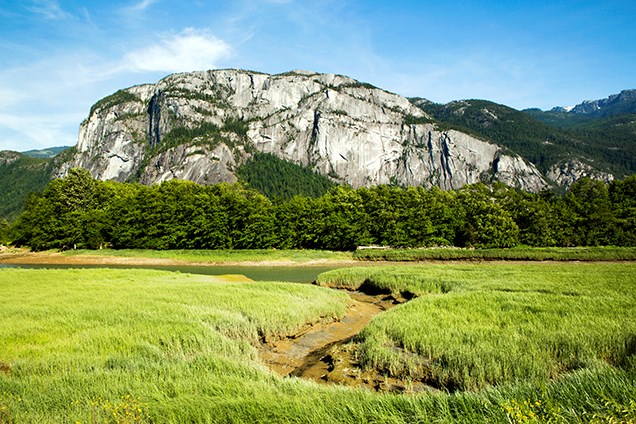"We have been very busy," said Sgt. Simon Gravel. "There has been a lot of activity all over — a lot of campers."
Since April 1, Sea to Sky officers have doled out 11 tickets and 12 warnings.
"There has been a lot of things going on. We get a lot of complaints of all sorts," Gravel said.
Tickets handed out so far were related to off-leash dogs, fishing without a license, and 4X4 drivers heading into sensitive habitat in the Squamish Valley.
Put a leash on Fido
This month, particularly on officers' radar are off-leash dogs in the Skwelwil'em Squamish Estuary Wildlife Management Area.
"It is illegal to have your dog off-leash there. Dogs off-leash and wildlife don't go together well," Gravel said.
"The primary mandate in the estuary is to protect wildlife and provide good habitat."
Gravel noted that locals might have gotten away with having their dog off-leash in the estuary in the past, but with the volume of people out on the trails these days, it is no longer sustainable.
"There is a huge increase in volume, and we get regular complaints about dogs harassing wildlife," he said, adding that officers have been doing outreach and education about the issue as well as ticketing.
"We have been very present there, but unfortunately, we still see lots of non-compliance there."
He said the estuary is a great place to take a dog on a leash, and he gets why folks like it, but they must comply with the rules.
Book it before you hook it
In terms of fishing, Gravel said it is crucial fishers who put out a line in Squamish remember they need a licence to fish.
Not complying can lead to a $115 fine.
Stay on valley roads and trails
Gravel said an increasing trend is folks in pickups going 4X4ing through creeks and other sensitive habitat in the Squamish Valley.
"There is a lot of sensitive habitat. There are flood plains and a lot of fish-bearing streams in the Squamish Valley," he said.
He said the people officers are seeing doing this aren't the typical 4X4ing drivers they usually see.
"It is attracting those people who want some adventures with their vehicles. It is what we call over-landing. It is a different crowd than the regular 4X4 people. It is people who are probably influenced by social media and car commercials. They want their nice truck to be tested... and get muddy, but it is not the place," Gravel said, adding it is likely a lack of education and not willful destruction.
Whether ignorance or not, their behaviour damage fish and their habitat in the process.
"The floodplain in the Squamish Valley is not a place for motor vehicles. It is an offence to damage the environment with a vehicle. Stick with the existing roads and trails."
Thus, officers are working with the Ministry of Forests, Lands, Natural Resource Operations and Rural Development, and other partners are focusing on this issue.
While the officers are trying to educate first, for willful destruction, the fine is $575, Gravel noted.
Don't leave a mess at your campsite
Campsites have been busy already this month, Gravel said.
"A lot of people are eager to get out and get a bit of an outdoor experience, and that is great. However, there are always cases where people come here without proper knowledge and education about... leaving no trace. Often some people have missed that messaging," he said, adding when you camp on Crown land, you have to leave it in as good or better condition than when you got there.
"That means to not litter, not crack any vegetation and not disturb the soil and another aspect is not attracting dangerous wildlife," he said, noting that food has to be stored so that it cannot be accessed by bears or other animals.
Leaving food or remains for bears teaches them that is how to get food and ultimately that can lead to the bear being killed when it, for example, breaks into a tent to access food where it got some before.
"It is a very hazardous situation. We run out of options. We would like to put the accountability on the campers, so that is why we are also enforcing that."
A fine of $230 can be levied if campers leave food unsecured.
"We are stretched, and we have a lot to do, but we thank the public for reporting any violations to the RAPP line," Gravel said.
To report a conflict with wildlife that threatens public safety call 1-877-952-7277
To report an environmental violation or poaching call 1-877-952-7277 (RAPP) or use this online form to file a report.
For fisheries violations related to salmon, contact Fisheries and Oceans Canada (DFO) at 1-800-465-4336.
Follow the travel restrictions
While it is not within their wheelhouse to patrol for those breaking provincial travel restriction rules, if officers come across someone where they shouldn't be, they can enforce orders. Gravel said, noting no officers were on shift this past weekend in Squamish
The provincial government instituted new travel restrictions on April 23 that ask folks to stay in their home region — Vancouver Island, the Lower Mainland and mainland B.C. northeast of Hope.
Drivers caught outside their home region for non-essential reasons will be turned back and could face a $575 fine.
~with files from Times Colonist


